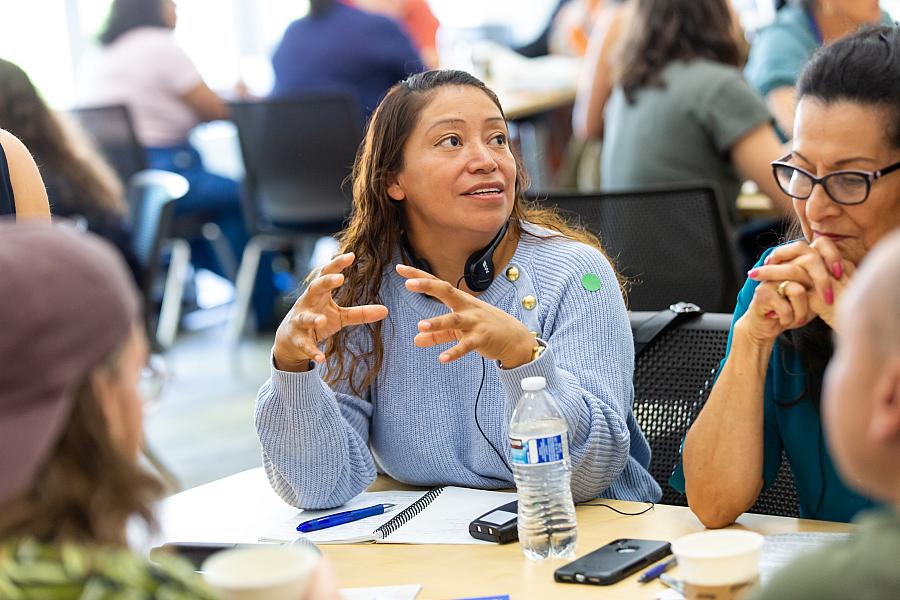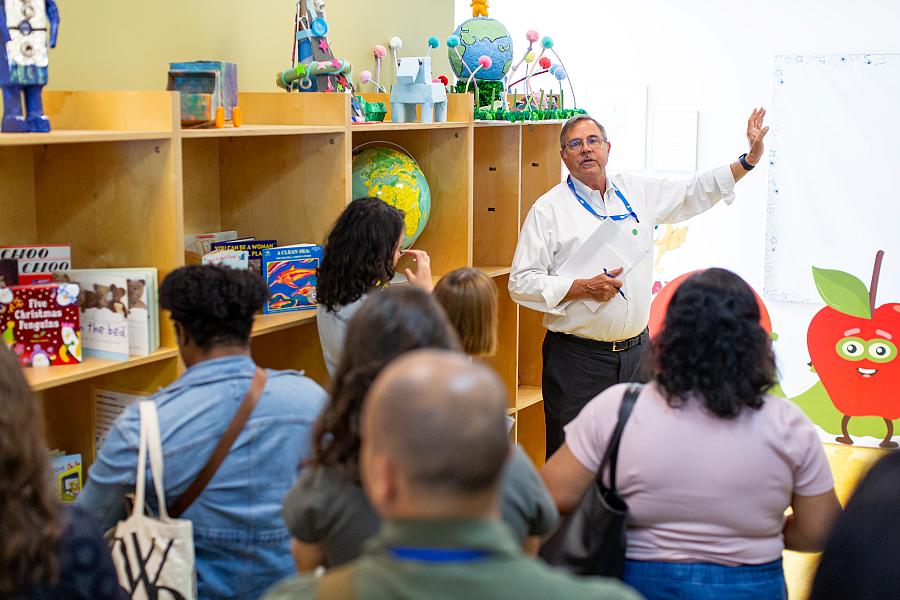Magnolia Place knits together services to support kids in one of LA’s most vulnerable communities

Julia, an immigrant from Central America, says the preschool and services at Magnolia Place in Los Angeles have been a huge help for her and her 3-year-old son, who is on the autism spectrum. She spoke to visiting journalists taking part in the 2025 National Fellowship on June 25.
(Photo by Jordan Jennings/Center for Health Journalism)
Julia had no idea that enrolling her 6-month-old baby in the child enrichment preschool at Magnolia Place in Los Angeles’ Pico Union neighborhood was a step toward helping her family and her community.
Speaking in Spanish through an interpreter, Julia described how her son, now 3, is on the autism spectrum. She said the preschool has been critical for his development, especially his ability to socialize with other children.
“It has been a difficult journey, but the effort has been worth it,” said Julia, an immigrant from Central America whose last name has been withheld for privacy. “He’s like a little train, once he found the tracks. Now, it's just up to me to guide him.”
The center also helped her family with tangible items, such as diapers and formula, and she participated in family mentoring, which included setting monthly goals. The experience prompted her to become a community leader, and she now teaches other families how to access resources.
Magnolia Place, run by the nonprofit All For Kids, is a community hub that brings together a network of services to support children and promote safe, strong and connected communities. From mental health counseling to parent coaching to financial support and banking services, the center’s focus aims to make families more resilient, economically stable and connected to their communities.
“The touchpoint that has always been important to us is to have the voice of (community residents) inform the work that we do,” said Blanca Garcia, project innovations manager for the Magnolia Community Initiative.
Garcia and some partner organizations talked about their collaborative model with journalists in USC Center for Health Journalism's 2025 National Fellowship visiting Magnolia Place this week.
Ronald Brown, president and CEO of All For Kids, was part of the leadership that conceptualized the Magnolia Collaborative Initiative in 2002. He said the center’s approach is based on early childhood research that identifies four elements — educational success, good health, economic stability, and safe and nurturing parenting — as essential for the well-being of children and families.

Ronald E. Brown, president and CEO of All For Kids, leads journalists participating in the 2025 National Fellowship on a tour of a preschool housed in Magnolia Place.
(Photo by Jordan Jennings/Center for Health Journalism)
All for Kids, previously the Children’s Bureau of Southern California, collaborates with a wide range of community members, government agencies, businesses and nonprofits. The organization operates more than 40 programs that focus on areas such as adoption, family stability, permanency for foster children and prevention of child abuse.
Magnolia Place opened in 2008 and is the flagship location for All For Kids’ community initiative. Located in a 46,000-square-foot converted warehouse, the site holds preschool classrooms, communal spaces and professional offices, all adorned with joyful children’s art. Playgrounds full of toys and tricycles and lush, green gardens by the entryway welcome visitors. The facility houses a free preschool, a Head Start program, a library, mental health care programs, a federally qualified health center run by St. John’s Clinic, LA County social services, financial coaching and family mentoring programs.
Wildwoods, a nonprofit organization that cultivates engagement with nature, is also located at the center. The group takes children and families on nature trips and maintains community gardens onsite, part of the organization’s mission to address the “nature deficit” stemming from a lack of parks and natural space in the area.
Wilson, founder of Wildwoods, said the largest green space in the neighborhood is a cemetery about a block and a half away, so the children have limited exposure to nature.
“Not all families have a safe space to play outside. I’m trying to alleviate that,” he said.
Magnolia Place serves a 5-square-mile area just west of downtown LA. The area is home to nearly 35,000 children and makes up one of the most densely populated neighborhoods in the country. About 90% of the residents are people of color and nearly three-fourths are immigrants, the majority Latino and Korean. In 2021, the median household income in the Pico Union area was $43,400, compared to $76,000 in LA County overall.
Before the pandemic, Brown said his organization went door-to-door to conduct community surveys, assessing demographics and residents’ needs. However, they haven’t been able to do any surveys since the pandemic.
Measuring the impact of this kind of service work can be challenging. All For Kids is trying to track third grade reading scores and high school graduation rates of preschool participants, but it has been difficult, in part because families move. Brown said local kindergarten teachers have reported that Magnolia preschool graduates are better prepared social-emotionally for school than other children.
With the arrival of ongoing raids in LA by U.S. Immigration and Customs Enforcement (ICE), far fewer people have been coming into Magnolia Place, due to fears of deportation.
Julia, the immigrant mother, said many community residents are afraid to take public transportation or even walk in the neighborhood.
Brown said they learned a lot about providing services using phone calls or online during the pandemic, which they have begun using again with the ICE raids.
“What we do is just be present … create an environment that's as safe as possible, listen a lot (and) provide whatever information that's out there … that’s real,” said Brown.

